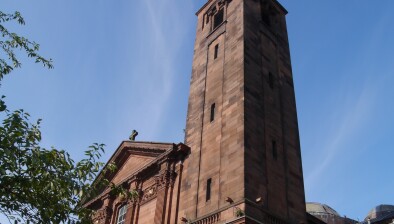Burrell refurbishment package backed by Glasgow City Council
 Ambitious plans for a £66 million refurbishment and redisplay of the Burrell Collection took a step closer after Glasgow City Council approved the next stage in funding for the development.
Ambitious plans for a £66 million refurbishment and redisplay of the Burrell Collection took a step closer after Glasgow City Council approved the next stage in funding for the development.
The move follows a major master planning exercise, which outlined plans which will see more than 90 per cent of the 9,000-strong collection on display (more than four times what is currently on display), the basement stores opened to the public for the first time and a new, central core which will greatly increase access to the many treasures collected by Sir William Burrell. There will also be improved café and retail opportunities and a new, civic events space outside.
The building which houses the Burrell Collection is in urgent need of refurbishment. Galleries have been closed because of danger of damage to objects and paintings as a result of water ingress. Glasgow City Council, Glasgow Life and Burrell Renaissance have been examining options for a refurbishment and redisplay of the collection – securing its home for generations to come and honouring the city’s debt to Sir William, who spent more than 75 years of his life amassing one of the world’s finest, single personal collections.
The master plan has produced the first detailed estimated costs for the project, with the figure expected to be in the region of £60 - £66m. The council has been asked to fund up to 50 per cent of the total cost, with the remainder split between the Heritage Lottery Fund (£15m application lodged), a fundraising campaign and grants from other public bodies.
The plans will see the Category A-listed building retain its impressive architectural footprint and façade in Pollok Country Park, but after the refurbishment, a major overhaul of the roof, building fabric, interior and ageing plant, will create an entirely new experience for visitors.
The building will also be an exemplar of sustainability, transforming it from a building that has a large carbon footprint, into an energy efficient, modern museum. The refurbished building will meet a significant portion of future energy requirements by using renewable sources, both within the building and the wider country park.
Councillor Archie Graham, the chair of Glasgow Life and depute leader of Glasgow City Council, said: “Sir William devoted more than 75 years of his life amassing one of the world’s finest, single personal collections – and he gave it all to Glasgow. We have a moral duty to protect and enhance what is undoubtedly the jewel in our cultural crown by providing a newly refurbished home which is worthy of its world-class status.
“Glasgow is Scotland’s cultural powerhouse and the Council’s decision to support these ambitious plans, demonstrates yet again the city’s commitment to our outstanding cultural heritage.”
Sir Angus Grossart, the chair of Burrell Renaissance, said: “We have been working hard to open out the great potential of the Burrell Collection and place Sir William’s great gift on a global stage. It is also of great importance that we provide a home worthy of these great treasures. The Council’s decision is yet another, very positive, step as we carry forward the torch handed to us by Sir William and seek to place his extraordinary collection within the international context which it deserves.”
During any closure, an exhibition of objects will be on display at Kelvingrove Art Gallery & Museum allowing continued access to citizens and visitors alike. To unlock the great potential of the collection and use it to promote Glasgow as one of the world’s great cultural cities, an international tour will showcase the collection to some of the world’s finest institutions, increasing awareness of Sir William’s gift and leveraging opportunities for fundraising toward the cost of the refurbishment.
As well as committing to the overall funding profile and estimated costs, the council’s Executive Committee approved an initial £5m in capital costs to progress the first stage of project, allowing detailed design development, including intrusive surveys to assess the true condition of the building and further detailed work on the visitor proposition and exhibition designs. The detail developed in this phase will allow for greater consultation with stakeholders and bring significant cost certainty as the project progresses.
An application has been made to the Heritage Lottery Fund for £15m – with a decision expected to be announced in May. Once confirmed, it is anticipated that the museum will close in early 2016 and reopen in 2019.

















